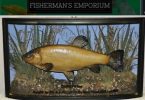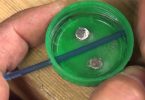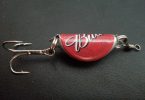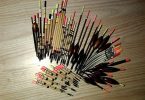Guidance notes prepared by
Dr Bruno Broughton, Fisheries Management Consultant
Dr Bruno Broughton, Fisheries Management Consultant
To prevent the spread of fish diseases and parasites from one fishery to another, many fishery owners have installed dip tanks at their lakes in the last few years. The initiative was prompted by outbreaks of Spring Viraemia of Carp (SVC) and fears that the disease could be transferred on angling equipment – keepnets, landing nets and carp sacks – which could have been in contact with infected fish.
The dips also help prevent the spread of external parasites, especially leeches and fish lice. Indeed, my personal view is that, for this reason alone, it is worth considering dip tanks. Both external parasites have been implicated in the spread of other diseases.
In terms of risk, the stocking of fish is the major potential danger. Before any fish introductions are carried out the fish should be subject to health checks to make sure that they are not carrying any dangerous parasites and diseases.
The real risk of transferring diseases on anglers’ equipment is very slim, but it is preventable. Moreover, it is also good for public relations to be seen to be taking action against a perceived risk, no matter how small.
Use of Dips
As a precautionary measure, the dip tanks should be used by all anglers competing in matches and, if possible, in pleasure angling sessions. Two large plastic tanks or tubs will be required, located close to the main access point for anglers – by the car park, perhaps. Here, a prominent notice should be erected to inform anglers that they must dip their keepnets, landing nets and carp sacks prior to fishing, then rinse them in water.
Suitable tanks include plastic, central heating header tanks, cattle watering tanks, plastic dustbins and ‘Wheelybins’.
Chemicals
The nets and sacks are immersed into a tank containing a dilute solution of an iodine-based disinfectant (iodophor), then rinsed in a clean-water tank – the iodophor is potentially toxic to fish. The two most widely-used chemicals are ‘Wescodyne’, which is manufactured by Ciba-Geigy Ltd, and ‘FAM 30′, made by Vanodine International and others.
Wescodyne should be diluted in a ratio of l½ parts to 100 parts of clean water, FAM 30 in a ratio of 1 part to 100 parts of clean water. Other products will require dilution to achieve a final concentration of 250 parts per million of active iodine. In each case, the manufacturer’s recommendations should be read carefully and observed.
The other, rinsing tank – which should be clearly labelled – must be filled with clean tap water. The water should be replaced periodically as it becomes contaminated with the dip solution rinsed from the nets.
Dip Time
The MAFF recommendation is for immersion in the disinfectant for 15-30 minutes to achieve complete sterility. However, a shorter dip period will kill many of the potential diseases and will be far more acceptable to anglers.
Disposal
The dip should be replaced periodically, but it should not be tipped into or close to a fishery. To prevent the risk of vandals overturning the tanks, it is suggested that they are part-buried or set in concrete. The dip tank should be fitted with a lid to prevent dilution by rainwater.
Suppliers
Both chemicals can be obtained from larger suppliers of agricultural equipment and chemicals.
FAM 30 can also be purchased from Evans Vanodine Ltd., Unit 142, Brierley Road, Walton Summit, Barber Bridge, Preston, Lancs. PR5 8AM. Tel: 01772 322200.
The Centre for Environment, Fisheries & Aquaculture Science (Tel: 01305 206673) should be able to advise on the availability of other products.
Advice
For more advice on this or other similar topics, contact me on:







